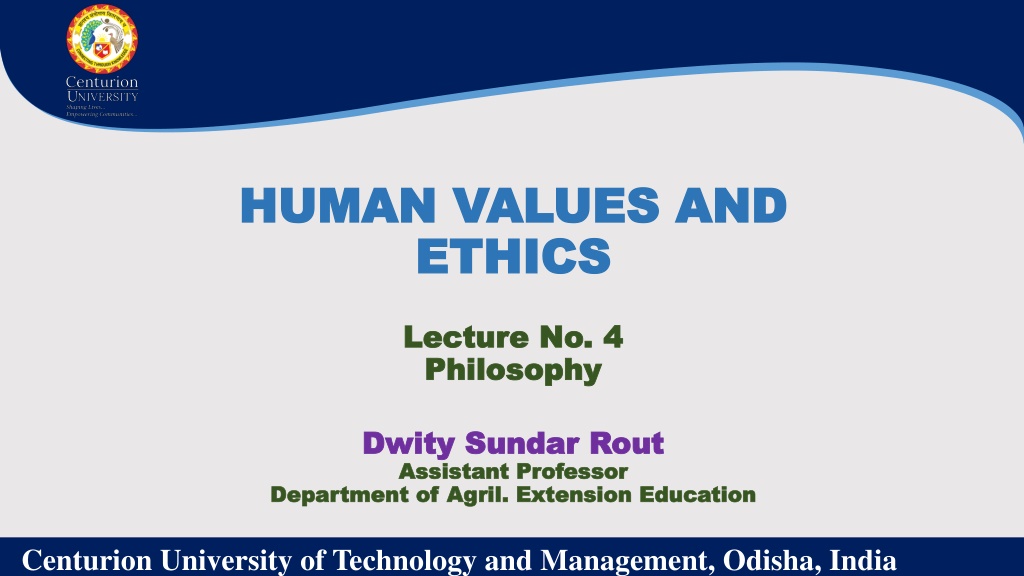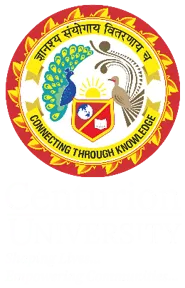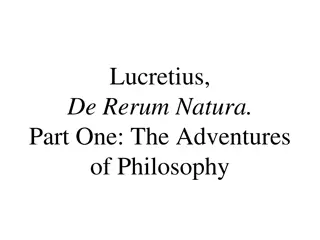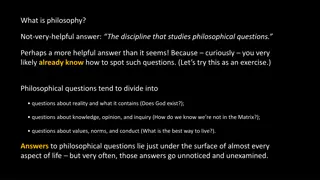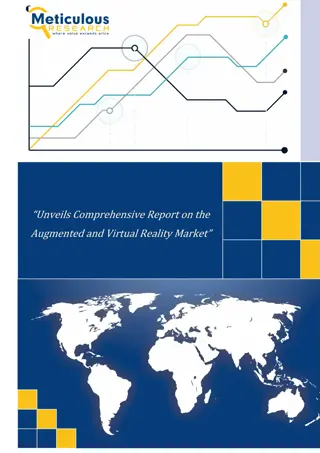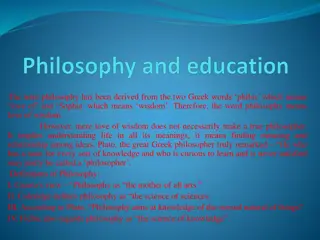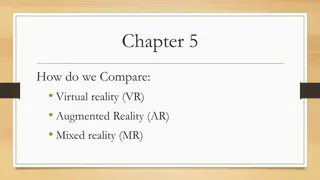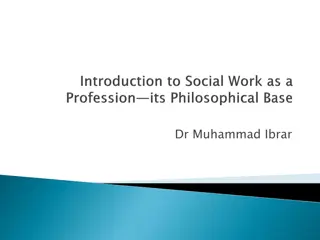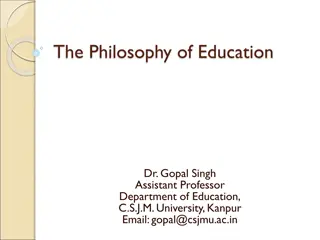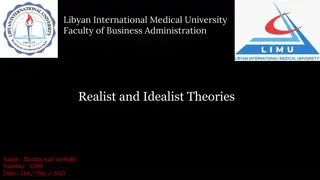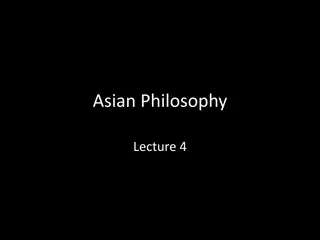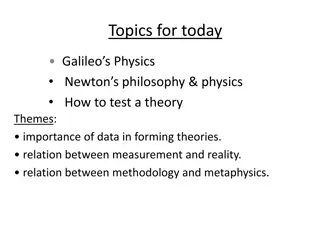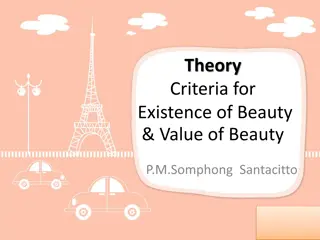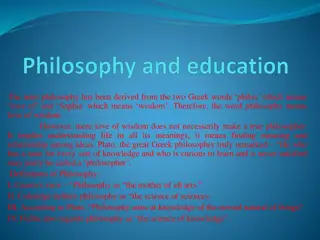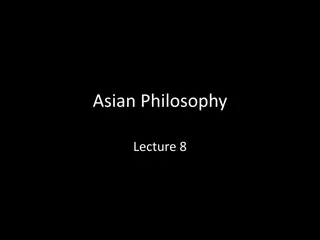Perspectives on Reality: Idealism vs. Materialism in Philosophy
Philosophy delves into fundamental questions about existence and reality. This lecture explores contrasting viewpoints of idealism, which posits that reality is mental, and materialism, which argues reality is physical. Examples from philosophers like George Berkeley and Karl Marx exemplify these perspectives, highlighting how philosophy offers different interpretations of the world. Through critical thinking, philosophical inquiry helps us reflect on our beliefs and assumptions.
Download Presentation

Please find below an Image/Link to download the presentation.
The content on the website is provided AS IS for your information and personal use only. It may not be sold, licensed, or shared on other websites without obtaining consent from the author. Download presentation by click this link. If you encounter any issues during the download, it is possible that the publisher has removed the file from their server.
E N D
Presentation Transcript
HUMAN VALUES AND HUMAN VALUES AND ETHICS ETHICS Lecture No. 4 Lecture No. 4 Philosophy Philosophy Dwity Sundar Rout Dwity Sundar Rout Assistant Professor Assistant Professor Department of Department of Agril Agril. Extension Education . Extension Education Centurion University of Technology and Management, Odisha, India
Philosophy Philosophy is the study of fundamental questions about existence, knowledge, values, reason, and more. It involves critical thinking, analysis, and reflection on various concepts and ideas. Centurion University of Technology and Management, Odisha, India
Example of Philosophy Question: What is the nature of reality? This question delves into the fundamental nature of the world around us and our perception of it. Philosophers throughout history have offered different perspectives on this question. Let's explore two contrasting viewpoints: Centurion University of Technology and Management, Odisha, India
1. Idealism Idealists argue that reality is fundamentally mental or immaterial. They posit that the external world we perceive is a product of our minds or consciousness. According to this view, the physical world is an illusion or a projection of our thoughts, ideas, or perceptions. Example: The philosophy of George Berkeley, an 18th-century idealist, asserts that objects only exist insofar as they are perceived. For instance, if a tree falls in a deserted forest and no one is there to perceive it, it does not have an independent existence. Its existence is contingent upon the presence of a conscious observer. Centurion University of Technology and Management, Odisha, India
2. Materialism Materialists, on the other hand, argue that reality is composed of physical matter and is independent of our perception. They contend that the physical world exists objectively and can be studied through scientific inquiry. According to materialism, consciousness and mental phenomena are emergent properties of the physical brain. Example: The philosopher Karl Marx, influenced by materialism, developed a theory of historical materialism, which holds that the development of society is primarily driven by the material conditions and economic relationships within it. Marx argued that social structures, ideologies, and institutions are shaped by the underlying economic realities of a given society. Centurion University of Technology and Management, Odisha, India
Conclusion These contrasting perspectives on the nature of reality exemplify how philosophy engages with fundamental questions, offering different interpretations and frameworks for understanding the world. Philosophical inquiry encourages critical thinking and helps us reflect on the underlying assumptions and implications of our beliefs and concepts. Centurion University of Technology and Management, Odisha, India
Branches of philosophy Philosophical questions can be grouped into various branches. These groupings allow philosophers to focus on a set of similar topics and interact with other thinkers who are interested in the same questions. Metaphysics, epistemology, ethics, and logic are sometimes listed as the main branches. There are many other subfields besides them and the different divisions are neither exhaustive nor mutually exclusive. For example, political philosophy, ethics, and aesthetics are sometimes linked under the general heading of value theory as they involve a normative or evaluative aspect. Furthermore, philosophical inquiry sometimes overlaps with other disciplines in the natural or social sciences, religion, or mathematics. Centurion University of Technology and Management, Odisha, India
Ethics (Cont) Ethics, also known as moral philosophy, studies what constitutes good and bad conduct, right and wrong values, and good and evil. Its primary investigations include exploring how to live a good life and identifying standards of morality. It also includes investigating whether there is a best way to live or a universal moral standard, and if so, how we come to learn about it. The main branches of ethics are normative ethics, meta-ethics, and applied ethics. Centurion University of Technology and Management, Odisha, India
Epistemology Epistemology Epistemologists examine putative sources of knowledge, including perceptual experience, reason, memory, and testimony. They also investigate questions about the nature of truth, belief, justification, and rationality. is the branch of philosophy that studies knowledge. Philosophical skepticism, which raises doubts about some or all claims to knowledge, has been a topic of interest throughout the history of philosophy. It arose early in Presocratic philosophy and became formalized with Pyrrho, the founder of the earliest Western school of philosophical skepticism. It features prominently in the works of modern philosophers Ren Descartes and David Hume and has remained a central topic in contemporary epistemological debates. Centurion University of Technology and Management, Odisha, India
Metaphysics Metaphysics is the study of the most general features of reality, such as existence, time, objects and their properties, wholes and their parts, events, processes and causation between mind and body. Metaphysics includes cosmology, the study of the world in its entirety and ontology, the study of being, along with the philosophy of space and time. and the relationship Centurion University of Technology and Management, Odisha, India
Logic Logic is the study of reasoning and argument. Deductive reasoning is when, given certain premises, conclusions are unavoidably implied.[122]Rules of inference are used to infer conclusions such as, modus ponens, where given "A" and "If A then B", then "B" must be concluded. Because sound reasoning is an essential element of all sciences,[123]social sciences and humanities disciplines, logic became a formal science. Sub-fields include mathematical logic, philosophical logic, modal logic, computational logic, and non-classical logics. Centurion University of Technology and Management, Odisha, India
Thank you Centurion University of Technology and Management, Odisha, India
